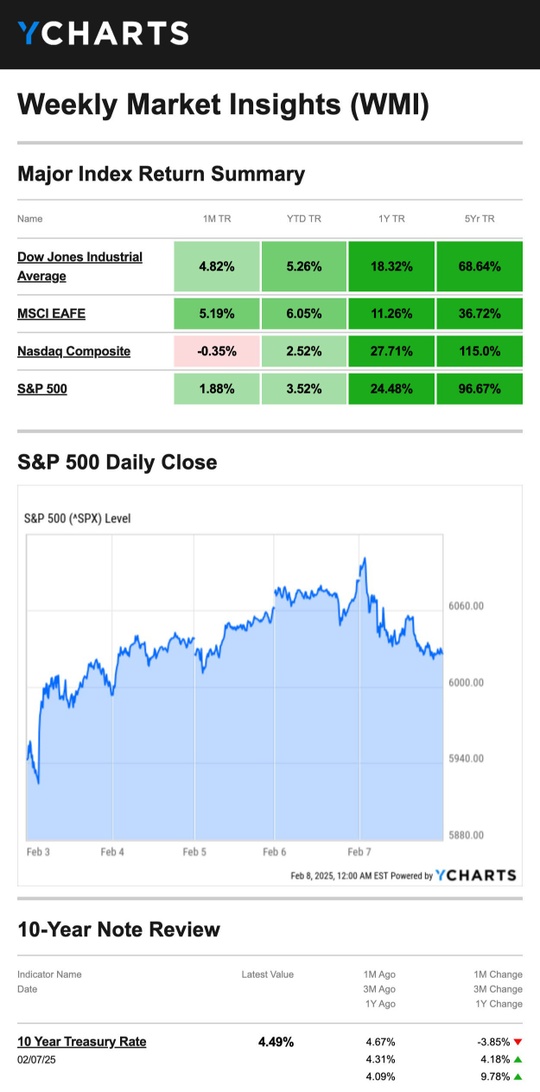Stocks posted modest losses last week as tariff deals, January jobs data, and Q4 corporate reports injected volatility into markets.
The Standard & Poor’s 500 Index slipped 0.24 percent, while the Nasdaq Composite Index lost 0.53 percent. The Dow Jones Industrial Average fell 0.54 percent. The MSCI EAFE Index, which tracks developed overseas stock markets, edged ahead 0.17 percent.1,2
Tariffs, Q4 Reports, and Jobs
On Monday, stocks opened lower on news that tariffs on Mexico, Canada, and China went into effect over the weekend. However, markets rebounded midmorning following news of a U.S.-Mexico deal that delayed new trade rules. News of a similar last-minute agreement with Canada followed.3
Stocks continued their rally midweek, led by technology stocks from companies that provided upbeat Q4 corporate reports.4,5
The S&P 500 and Nasdaq rose for the third consecutive day on Thursday, while the Dow experienced a slight fall as investors digested more corporate earnings reports. The week closed on a down note as a mixed jobs report and a cautionary inflation outlook disappointed investors.6,7


Source: YCharts.com, February 8, 2025. Weekly performance is measured from Monday, February 3, to Friday, February 7. TR = total return for the index, which includes any dividends as well as any other cash distributions during the period. Treasury note yield is expressed in basis points.
Mixed Signals on the Labor Market
As has happened several times in recent years, two job reports told conflicting stories about the state of the jobs market. On Friday, the Bureau of Labor Statistics reported that 143,000 jobs had been added for the month–a four-year low. Earlier in the week, the ADP report showed the economy added 188,000 new jobs, ahead of the 150,000 economists expected.8,9
Why do the reports tell different stories? Economists point to various factors, including how January can be challenging to measure accurately, typically due to the more significant number of laid-off seasonal workers.10
This Week: Key Economic Data
Tuesday: Cleveland Fed President Beth Hammack and New York Fed President John Williams speak.
Wednesday: Consumer Price Index (CPI). Atlanta Fed President Raphael Bostic speaks. Federal budget.
Thursday: Weekly Jobless Claims. Producer Price Index (PPI).
Friday: Import Price Index. Retail Sales. Industrial Production. Business Inventories.
Source: Investors Business Daily – Econoday economic calendar; February 7, 2025
The Econoday economic calendar lists upcoming U.S. economic data releases (including key economic indicators), Federal Reserve policy meetings, and speaking engagements of Federal Reserve officials. The content is developed from sources believed to be providing accurate information. The forecasts or forward-looking statements are based on assumptions and may not materialize. The forecasts also are subject to revision.
This Week: Companies Reporting Earnings
Monday: McDonald’s Corporation (MCD), Vertex Pharmaceuticals Incorporated (VRTX)
Tuesday: The CocaCola Company (KO), S&P Global Inc. (SPGI), Shopify Inc. (SHOP), Gilead Sciences, Inc. (GILD)
Wednesday: Cisco Systems, Inc. (CSCO), AppLovin Corporation (APP)
Thursday: Applied Materials, Inc. (AMAT), Deere & Company (DE), Palo Alto Networks, Inc. (PANW), Brookfield Corporation (BN), Moody’s Corporation (MCO)
Source: Zacks, February 7, 2025. Companies mentioned are for informational purposes only. It should not be considered a solicitation for the purchase or sale of the securities. Investing involves risks, and investment decisions should be based on your own goals, time horizon, and tolerance for risk. The return and principal value of investments will fluctuate as market conditions change. When sold, investments may be worth more or less than their original cost. Companies may reschedule when they report earnings without notice.

“Understanding is a two-way street.” –Eleanor Roosevelt

Beware of Ghost Preparers
Ghost preparers don’t sign the tax returns they prepare, which is unethical and illegal. All paid preparers must sign and include their Preparer Tax Identification Number (PTIN) on the return, and if they don’t, this is a big red flag. These preparers might also promise unrealistic refunds or charge fees based on the size of the refund.
The IRS also has a page on IRS.gov dedicated to helping taxpayers choose a reputable tax professional and a Directory of Federal Tax Return Preparers with Credentials and Select Qualifications.
This information is not a substitute for individualized tax advice. Please discuss your specific tax issues with a qualified tax professional.
Tip adapted from IRS11

Two Leg Stretches to Try at Your Desk
We spend so much time sitting at our desks, so getting some stretches here is good, especially after a long day. The good news is that you don’t have to leave your desk to get these two stretches in!
- Hip and Knee Flexion Stretch. For this stretch, hug one knee at a time and gently pull it toward your chest. Hold the pose for 10-30 seconds and repeat on both sides. This post will stretch your quads, hamstrings, and hips.
- Hamstring Stretch. For this stretch, remain seated and extend one leg straight before you. Reach toward your toes without hyperextending, and hold the stretch for 10-30 seconds. Repeat on the other side. You’ll feel this stretch in your hamstrings and lower back.
Tip adapted from Healthline12


Plitvice Lakes National Park
Republic of Croatia, Croatia
Footnotes and Sources
1.The Wall Street Journal, February 7, 2025
2. Investing.com, February 7, 2025
3.The Wall Street Journal, February 3, 2025
4.CNBC.com, February 4, 2025
5.CNBC.com, February 5, 2025
6.The Wall Street Journal, February 6, 2025
7. The Wall Street Journal, February 7, 2025
8.MarketWatch.com, February 4, 2025
9.MarketWatch.com, February 5, 2025
10.The Wall Street Journal, February 7, 2025
11. IRS.gov, February 23, 2024
12.Healthline, October 3, 2024
Investing involves risks, and investment decisions should be based on your own goals, time horizon, and tolerance for risk. The return and principal value of investments will fluctuate as market conditions change. When sold, investments may be worth more or less than their original cost.
The forecasts or forward-looking statements are based on assumptions, may not materialize, and are subject to revision without notice.
The market indexes discussed are unmanaged, and generally, considered representative of their respective markets. Index performance is not indicative of the past performance of a particular investment. Indexes do not incur management fees, costs, and expenses. Individuals cannot directly invest in unmanaged indexes. Past performance does not guarantee future results.
The Dow Jones Industrial Average is an unmanaged index that is generally considered representative of large-capitalization companies on the U.S. stock market. Nasdaq Composite is an index of the common stocks and similar securities listed on the NASDAQ stock market and is considered a broad indicator of the performance of technology and growth companies. The MSCI EAFE Index was created by Morgan Stanley Capital International (MSCI) and serves as a benchmark of the performance of major international equity markets, as represented by 21 major MSCI indexes from Europe, Australia, and Southeast Asia. The S&P 500 Composite Index is an unmanaged group of securities that are considered to be representative of the stock market in general.
U.S. Treasury Notes are guaranteed by the federal government as to the timely payment of principal and interest. However, if you sell a Treasury Note prior to maturity, it may be worth more or less than the original price paid. Fixed income investments are subject to various risks including changes in interest rates, credit quality, inflation risk, market valuations, prepayments, corporate events, tax ramifications and other factors.
International investments carry additional risks, which include differences in financial reporting standards, currency exchange rates, political risks unique to a specific country, foreign taxes and regulations, and the potential for illiquid markets. These factors may result in greater share price volatility.
Please consult your financial professional for additional information
This content is developed from sources believed to be providing accurate information. The information in this material is not intended as tax or legal advice. Please consult legal or tax professionals for specific information regarding your individual situation. This material was developed and produced by FMG Suite to provide information on a topic that may be of interest. FMG is not affiliated with the named representative, financial professional, Registered Investment Advisor, Broker-Dealer, nor state- or SEC-registered investment advisory firm. The opinions expressed and material provided are for general information, and they should not be considered a solicitation for the purchase or sale of any security.
Copyright 2025 FMG Suite.